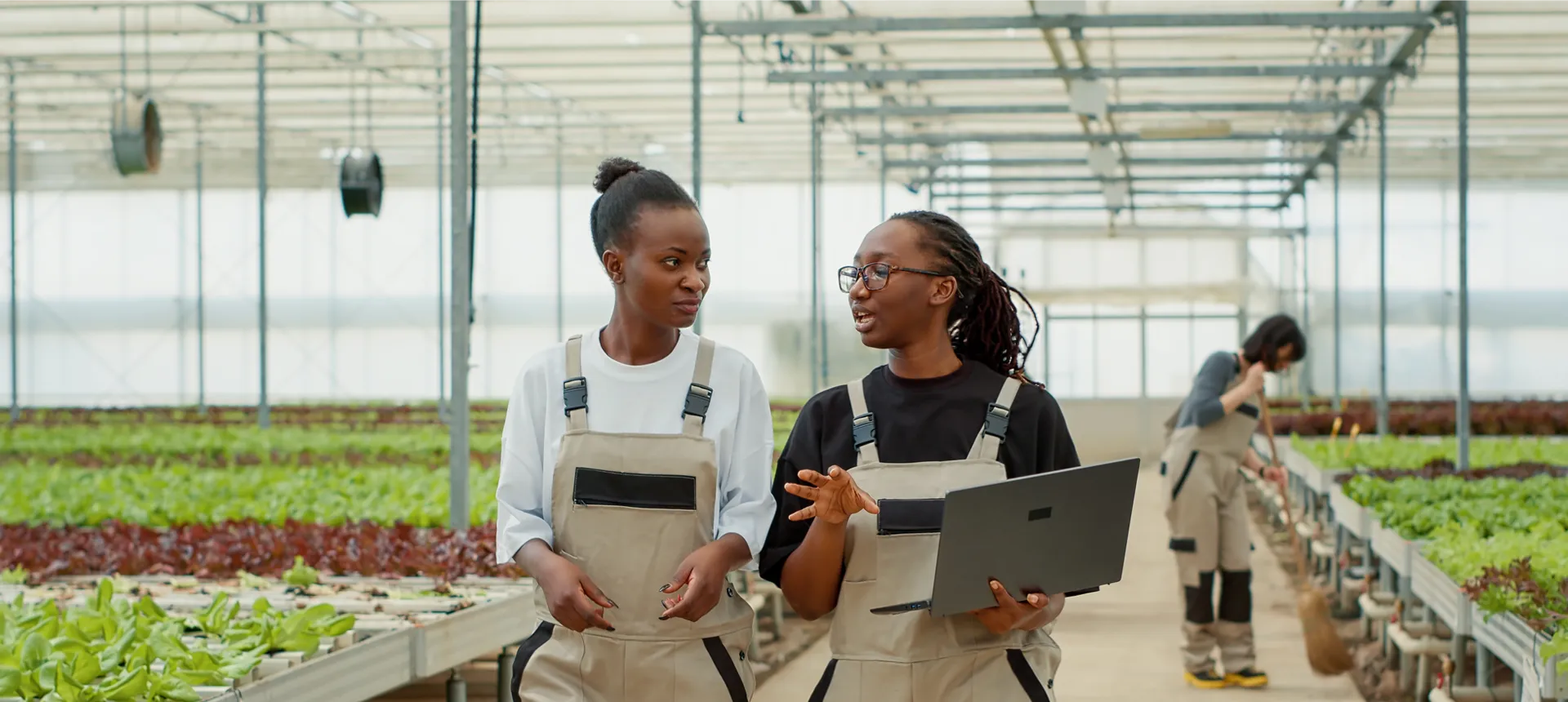

Agricultural Automation Technician - Greenhouse System Controls
Overview
A career as an automation technician for greenhouse systems means you're playing an active role in optimizing crop production by implementing and maintaining technologies that ensure efficient and sustainable farming practices.
In response to the significant impact that advanced technologies are having across a multitude of sectors, including modern agricultural operations, the Lambton College Agricultural Automation Technician – Greenhouse System Controls, Ontario College Diploma is designed specifically to meet the operational needs of the Canadian controlled environment agriculture industry including greenhouses, vertical and container farming and related areas.
In this multi-disciplined program, students learn to integrate emerging technologies within agricultural business operations to improve efficiency by providing real-time information monitoring through automation and controls. Utilizing Lambton’s long-established strengths in instrumentation and mechanical technologies, curriculum includes installation, calibration, and troubleshooting, of various equipment and systems used in the agricultural industry. Students study an array of disciplines including electrical, mechanical, power generation and software systems integration.
To provide a robust understanding of the Canadian greenhouse agriculture sector, students also study the science and production of plants, integrated pest control management, sustainable energy solutions, as well as new agri-technology equipment and industry trends. Program graduates will effectively recognize hardware and software integration that may be applied to agricultural production in order to ensure proper operation and optimize the environment for maximized productivity.
Admission Requirements
O.S.S.D. or equivalent with:
- Grade 12 English C or U
- Grade 12 Mathematics C or U
The admissions process is competitive and meeting the minimum academic requirements does not guarantee admission.
Lambton College reserves the right to alter information including admission requirements and to cancel a program or course at any time; to change the program curriculum as necessary to meet current competencies or changes in the job market; to change the pathways to third-party certification bodies; or to withdraw an offer of admission both prior to and after its acceptance by an applicant or student because of insufficient applications or registrations or over-acceptance of offers of admission. In the event Lambton College exercises such a right, Lambton College's sole liability will be the return of monies paid by the applicant or student to Lambton College.English Language Requirements
- IELTS of 6.0
- or -
- TOEFL iBT 69
- or -
- Passed Lambton Institute of English placement test
Meeting the minimum English requirements does not guarantee admission. Students with higher English proficiency scores will receive priority in the admission assessment process.
Join Our Award-Winning Enactus Team
Become part of Lambton College's globally recognized Enactus team and gain invaluable presentation, organization, and interpersonal skills.
Learn more
Women in Technology & Trades
Discover how Lambton College's Women in Technology & Trades (WiTT) group is empowering women to excel in technology and trades.
Visit our WiTT page for more information on mentorship opportunities, events, and resources designed to support your journey in these dynamic fields.
Learn More
Costs
- Term 1 $7,975.00
- Term 2 $7,200.00
- Term 3 $7,900.00
- Term 4 $7,200.00
Total Cost of Program
Tuition fees are estimates and are subject to change each academic year. Fees do not include books (unless specifically noted), supplies or living costs.
Lambton College reserves the right to alter information including admission requirements and to cancel at any time a program or course; to change the location and/or term in which a program or course is offered; to change the program curriculum as necessary to meet current competencies or changes in the job market; to change the pathways third-party certification bodies; or to withdraw an offer of admission both prior to and after its acceptance by an applicant or student because of insufficient applications or registrations or over-acceptance of offers of admission. In the event Lambton College exercises such a right, Lambton College’s sole liability will be the return of monies paid by the applicant or student to Lambton College.
Technology Requirements
In order to keep pace with the requirements of each and every course in your program, Lambton College requires that each student have access to a laptop while studying at our college.
Courses
Canadian Agri-Business Fundamentals
This course familiarizes students with the diverse and bountiful nature of the agricultural industry in Canada. Students will be introduced to the unique operations of Canadian agri-business from a regional, provincial and national perspective. Students will gain the knowledge of Canada's stature in the global marketplace. As well, key business concepts will be introduced to assist in building a foundation for sound decision making. Students will develop a strong understanding of the rural support mechanisms and organizations in place to ensure safe, viable and sustainable food production in Canada.
Plant Science
In this course, students study plant environment in relation to plant structure in a controlled greenhouse environment. Students learn the various terms surrounding plant science and understand plant adaptation to various environments, including plant nutrition. Curriculum includes plant reproduction, tissue culture, soils, fertilizers and soilless media for growth.
Canadian Greenhouse Production
This course provides students with a comprehensive understanding of Canada's expanding greenhouse industry, covering controlled environment agriculture (CEA), automation, hydroponic systems, and integrated pest management (IPM). Students explore the economic impact, production techniques, and sustainable innovations in greenhouse operations while gaining insights into chemical and biological pest control strategies. The course covers the production of key greenhouse crops, including bedding plants, potted plants, flowering plants, vegetables, and cannabis, while also analyzing internal greenhouse environments, climate control strategies, and resource management to optimize production efficiency. By the end of the course, students develop technical, analytical, and problem-solving skills, preparing them for careers in greenhouse crop production, agribusiness management, and the rapidly growing controlled-environment agriculture sector.
Canadian Workplace Health & Safety
In providing an overview of Canadian Labour laws, workplace rules and regulations, and Health and Safety Hazards in the workplace, students gain an understanding of the responsibilities of employers, worker's rights as well as the responsibilities of various organizations in the Canadian labour industry. Awareness and recognition of various health and safety risks arising from a variety of occupations is also covered.
Basic Engineering Drawings
Millwrights and technicians require the ability to sketch, read, and interpret engineering drawings and schematics. These skills are necessary in order to comply with drawing standards and specifications while installing and maintaining machinery. Topics in this course include orthographic projection, multi-view projection, dimensioning, the title block and drawing notes. A variety of view types will be examined including auxiliary, assembly, detail, isometric and section. As well, an introduction to welding symbols and geometric tolerances will be covered.
Critical Thinking & Writing
In this writing course, students respond to current issues and news articles via various styles of paragraphs and essays. Students practice thinking critically and organize and hone their writing to ensure clarity and correctness in their messages. Students explore different perspectives, and through synthesis, analysis, and response, strive for clarity of message and diplomatic expression of opinion based on fact. One of the pillars of Lambton College is a commitment to sustainability and equity, diversity, and inclusion, including Indigenization of the curriculum; where appropriate, readings in this course will reflect this commitment. Critical Thinking and Writing lays the foundation for a subsequent research-writing course.
Mathematics for Electric Circuits
This course reviews and develops topics in basic computation, measurement, algebra, geometry, trigonometry, and linear functions, emphasizing their electrical applications.
Job Search & Success
This course provides student with skills and knowledge to help support their career search and succeed in the workplace. Students align their personal skill set and goals to guide them on their career paths. They will learn how to effectively conduct a job search, build a professional and well-tailored resume and cover letter, and develop and practice interview techniques. Students will also develop their personal brand to help support effective career networking and aid in their job search. Teamwork and collaboration in the workplace are also discussed. Self-reflection is used to inspire insight and support their professional career journey.
Fundamentals of Instrumentation
This introductory course in process instrumentation and safety includes instrumentation handling safety, work safety, electrical and mechanical shop practices, blueprint reading, overview of instruments, and wiring. The use and operation of equipment associated with sensors and measuring instruments and the fundamentals of process variables such as temperature, pressure, and level measuring instruments are introduced. Other topics include primary sensing devices, terminology and symbols, and test equipment usage including calibration procedures. The laboratory portion of the course allows students to become familiar with various types of test equipment, connection of instruments to sense process variation, apply calibration standards, and learn troubleshooting skills.
Boiler & HVAC Systems
This is an introductory course to Boiler and HVAC systems, which will give a general overview of process equipment, systems, and techniques. The codes and regulations that apply will be discussed. Emphasis will be placed on safety concerns such as WHMIS, plant safety, protective equipment, fire protection and extinguishing equipment, and environmental impacts. Process drawing fundamentals, basic process equipment such as steam traps, relief valves, piping systems, and lubrication systems will be studied.
Greenhouse Tools & Equipment
Maintaining and protecting greenhouses is vitally important to ensure good yields. This course covers the fundamentals of hand and power equipment, measuring tools, materials, and maintenance practices used in Canadian greenhouse operations. Students select and use references, tools, methods, and procedures, to alter various mechanical components to given specifications. The concept and importance of maintenance plan schedules are also introduced. including routine inspections of greenhouse structures, frames, doors, floors, paneling, ventilation, fans, heating, and boilers are introduced and discussed.
Electrical Fundamentals
This course introduces electrical principles that are fundamental to the operation and control of industrial equipment. Topics include: safe practices, electrical terminology, symbols, AC and DC circuit analysis principles, introduction to transducers, transformers and how DC and AC electric motors operate and are controlled. A laboratory component runs concurrently with the lectures. Lecture and laboratory are designed and scheduled to supplement and reinforce the learning outcomes of the course.
Introduction to Sustainable Development
This course introduces the concept of sustainable development to a broad audience. Students are presented with the factors that affect the environmental, economic and social sustainability of our communities. The course investigates the development of human populations and how their need for resources (e.g. energy, food, water) has compromised the natural ecosystems. Social and economic factors are explored in the context of social equality and sustainability in the local and global economy. The effects of individual lifestyle changes on the sustainability of communities are also examined.
General Education Elective
Work Term (Full-Time)
Co-operative education provides students with the opportunity to apply classroom learning to the workplace, undertake career sampling and gain valuable work experience that may assist students in leveraging employment after graduation.
Capstone Preparation
The capstone project in the final term is designed to consolidate student learning with valuable hands-on experiences to help develop them into well-prepared, well-rounded and employment-ready graduates. This course is designed to prepare students for the skills and competencies necessary for a successful capstone project. Students focus on research methodology, communication, leadership and collaboration skills necessary for success. Utilizing the technical capabilities applied throughout the program and how these may be integrated in managing successful project, including fundamental roles and tasks used to solve real-world problems within industry are introduced. In addition, students focus on required maintenance necessary for sustainable operations of interconnected greenhouse systems.
Greenhouse Horticulture
This course will introduce common practices and the theory behind plant production science in greenhouses. Students will learn the importance of environmental factors such as light, temperature and water management on plant growth. Considerations for managing plant growth for building a finishing schedule and concepts of integrated pest management will be introduced.
Data & Technology for Digital Farming Systems
In this course, students will apply various technologies to collect, manage and share data from a variety of sources for analysis. In the lab, students operate data collection equipment and plan experiments utilizing hardware and software applications.
Controlled Environment Agriculture Systems
Pneumatics & Hydraulics
This course develops an understanding of the basic principles and applications of pneumatics and compressed air safety as it relates to pneumatic systems. Basic hydraulic principles and the ability to perform pertinent hydraulic calculations, install, maintain and troubleshoot components will also be covered. Valves are used extensively in pneumatics, hydraulics and throughout all sections of industry. Knowledge of valve types, purposes and correct selection for specific systems will be covered. The operation, function and maintenance of ventilation, dust collection and cooling towers will also be included.
Introduction to Digital Logic & Programmable Logic Controllers
This course is designed to give technology students a thorough understanding of digital techniques and logic circuits, as applied to Industrial Control Circuits and to Processor Based Control Systems. The foundation of the course begins with a study of digital logic gates and functions and expands to include combinational and sequential logic, culminating with a study of the architecture and functioning of microprocessor-based systems such as computers, programmable logic controllers (PLCs) and industrial control systems.
Remote Communication & Data Integration
Modern Canadian agricultural operations have the equipment and know-how to remotely collect and manage information from the field. The capturing of data from equipment, and then transferring the data in real time is the basis for this course. Students study cellular and satellite systems that transfer data directly to computers for immediate access to improve overall efficiency in agricultural operations.
General Education Elective
Sustainable Food Production
This course is an introduction to the field of sustainable food production. With the rise in advanced agricultural practices that use fewer materials and energy, generate less waste and cause less negative environmental impact, sustainable agriculture creates increased efficiency, food security and reduced operational costs. Students study a systems approach for agricultural food production that considers the cultural and environmental factors required to manage soils, plant diseases, insect problems and crop quality. Application to organic commercial food production as well as urban food production are also discussed.
Integrated Pest Management
In this course, students are introduced to Integrated Pest Management (IPM). Students learn to investigate the importance of sustainable processes that combine biological, cultural, physical and chemical tools to identify, manage and reduce risk from a variety of pests. Students also select pest management tools and strategies in a way that minimizes environmental risks in controlled environments.
Robotics & Automation
With the arrival of industry 4.0, automated systems have become more powerful than ever before. Robotic and PLC systems are now commonly placed in most of today's industries. This integrated lecture/laboratory course will introduce learners to the fundamentals of industrial automated systems. Students will be required to write PLC programs in ladder logic that will perform tasks and control equipment. Students will also learn how to program and operate robots in a safe manner by studying the various safety systems that are a major component of automated robotic cells.
Agricultural Automation & Controls
In this course, students learn about software controls of greenhouse systems automation and robotic systems used in agricultural operations and equipment. Students learn to control systems and connect them in order to generate meaningful data to be used in a variety of agricultural applications.
Preventative Maintenance for Controlled Environment Agriculture
Building upon the fundamental skills learned in AGT 2013/ Greenhouse Tools and Equipment, students apply their knowledge to common greenhouse maintenance issues pertaining to various ventilation, fans, heating, and boilers. Maintenance plan schedules, including routine inspections of greenhouse structures, frames, doors, floors, paneling, ventilation, fans, heating, and boilers are discussed. This hands-on course provides students the opportunity to troubleshoot a variety of basic machinery used in the greenhouse environment in an effort to maintain and in some cases, extend the life of equipment.
Capstone - Smart Greenhouse
In this culminating capstone project, students work collectively to integrate a variety of technologies to efficiently and effectively monitor and control greenhouse operations.
General Education Elective
Contact
Centre for Global Engagement
LAMBTON COLLEGE SARNIA
1457 London Road
Sarnia ON N7S 6K4
After Graduation
Employment Opportunities

Career positions may include, but are not limited to:
- agricultural automation technician
- horticulture technician
- crop harvesting technician
- greenhouse control systems technician
- production support technician
- greenhouse operator
- mechanical engineering technician
- agricultural machinery specialist
- agricultural equipment mechanic
Looking for Support After Graduation?
The International Graduate Services & Support Centre (GSSC) is a place dedicated to assisting International alumni as they seek employment and settle into Canadian life following graduation.
Post-Graduate Employment
International students who successfully complete their programs of study at Lambton College may be eligible to apply for a Post-Graduation Work Permit (PGWP) Program. This program allows students to gain valuable Canadian work experience.
A work permit under the PGWP may be issued for the length of the study program, up to a maximum of three years. A post-graduation work permit cannot be valid for longer than the student's study program, and the study program must be a minimum of eight months in length. The length and approval of the PGWP is determined solely by Immigration, Refugees and Citizenship Canada (IRCC).
Students must meet the eligibility requirements to apply for a post-graduation work permit.
Immigration Regulations & Changes
Immigration regulations are legislated by the Federal Government of Canada and are subject to change at any time without notice. Students are responsible for ensuring that they are in compliance with all Immigration, Refugees and Citizenship Canada regulations at all times during their studies and while in Canada. Lambton College staff are not authorized to provide advice or guidance on immigration-related matters. Prospective applicants and current students should consult the Immigration, Refugees and Citizenship Canada website or call the IRCC Call Centre at 1-888-242-2100 to answer or clarify any immigration-related questions or information.
Co-op
About Co-op
Students in this program have the opportunity to gain valuable work experience by applying classroom learning during co-op experiences.
Learn more about co-op terms and the roles and responsibilities of students and co-op advisors.
More Information
Student Responsibilities
- Course and program delivery schedules are proposed and subject to change for each intake.
- Students are required to bring their own laptop with wireless capability.
- Students are advised to bring an official copy of their most recent police clearance, driver's license, and vaccination record from their home country.

Technology Requirements
It is recommended that students purchase a laptop with a Windows operating system.
Internet Speed Requirements
For best performance for students learning remotely, an internet connection with a minimum of 40 Mbps download and 10 Mbps upload speed is recommended in order to effectively use video conferencing and remote lecture delivery software as well as, other online resources remotely. Due to the large area over which students may be dispersed, we are unable to recommend a specific provider, so you will need to inquire around your area to find one that best suits your needs.
Minimum Laptop Requirements
In order to access the internet and virtually-delivered software and courseware, student laptops should include the following at a minimum. By meeting the following specifications, students will be equipped to access software and courseware on their laptop through the internet:
- Intel i5 8th Gen Processor or equivalent
- 16 GB of RAM (with a minimum of 8 GB)
- 100 GB HDD or more
- HD Graphics
- Webcam with a microphone
- Wireless 802.11n/ac 5ghz capable
- Windows Operating System (Windows 11)
Please note that Chromebooks and MacBooks may not support all software required for your program; students should verify compatibility with their professors.
Software
To ensure students are getting the most our of their classroom experience, some software will be required.
Lambton College has made this software easily accessible online. Students can leverage our Microsoft Office 365 software packages and services. In addition, much of the software you require for your courses will be available on demand for use on any device - on or off campus.